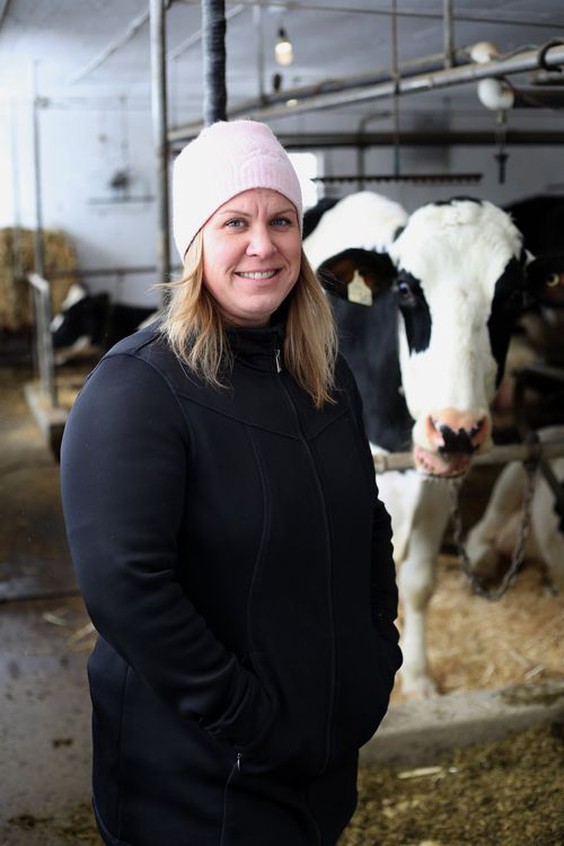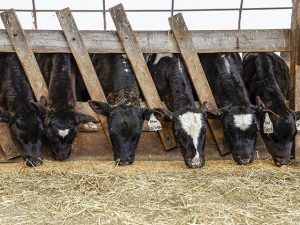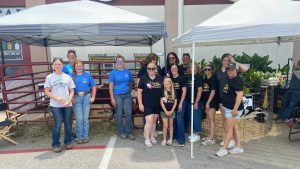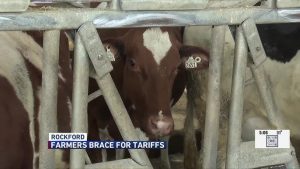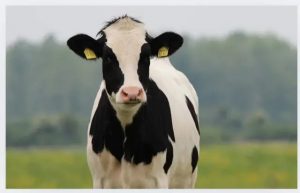
Deborah Vanberkel is the latest to receive the Canadian Federation of Agriculture’s Brigid Rivoire Award for Champions of Agricultural Mental Health, an award she is being given in recognition of her work establishing the Farmer Wellness Program, which she founded in 2019 in Lennox and Addington County and which has expanded to four other county farm organizations.
The program offers farmers access to free, accessible counselling and mental health support through the Lennox and Addington Federation of Agriculture — services not traditionally on the radar of those who live and work in agricultural settings.
The fact that the program has taken root and is spreading in such a short period of time speaks to the need for such a program in rural areas, Vankberkel believes.
Vanberkel runs a 40-cow dairy operation with her husband in the Odessa area, where she also runs a registered psychotherapy practice.
After hearing the story of a farmer in western Ontario in 2017 who was reaching out for help in the face of a serious mental health crisis, Vanberkel was alarmed into action.
“This person was going to end their (life),” she said. “They were reaching out. It went through veterinarians, then came to light in our area at a dairy producers meeting. How did it get here? It flew through how many different people.”
That incident inspired Vanberkel to begin her program — Farmer Wellness Program — which offers four counselling sessions free of charge to farmers in Lennox and Addington County but also helps to raise awareness about what mental health actually is, among a population known for its pride in stoicism and hard work.
“Farming has an inherent amount of stress,” Vanberkel admitted. “And (mental health) is not something that generations have discussed. What they’ve been discussing their whole lives is, ‘This has to get done. Pull your boot straps up.’”
It’s also about matching farmers with counsellors who can be available outside of a traditional office environment and outside of regular business hours, and who understand the unique stressors involved in the farming industry. Those accessibilities break down communication barriers and makes mental health support more accessible.
“When I started this a few years ago, it was because I had so many people telling me, ‘There’s nothing for us.’ Friends or family would ask questions or say, ‘No one would ever understand it.’”
A report from the Standing Committee on Agriculture and Agri-Food in May 2019, titled Mental Health: A Priority for our Farmers, referenced a Canada-wide survey of farmers conducted by Andria Jones-Bitton, associate professor at the Ontario Veterinary College at the University of Guelph.
According to that survey, 45 per cent of respondents reported high stress levels, 58 per cent anxiety and 35 per cent depression.
Also referenced in that report was a 2018 study that, according to Nicholas Carleton, a professor in the department of psychology at the University of Regina, found that suicide among agriculture, forestry and fishery workers was higher than in the rest of the population worldwide.
Vanberkel said the suicide rate among farmers is difficult to quantify, as they often present as on-the-job accidents.
Making mental health part of the farming conversation is important to Vanberkel, and she sees the parallels between farmers putting in the time to care for themselves as much as for the animals and equipment that make their livelihoods possible.
“It’s like tractors or livestock,” she said. “You have to maintain them. You have a vet come in to maintain whole herd health. You do maintenance on equipment to make sure it works, season after season. (Mental health) is no different: it’s you getting the type of health support you need, whether that’s counselling or finding your own strategies to keep you working.”
And helping individuals recognize their own health challenges is the first step — helping them “understand what their mental health looks like.”
“Most don’t know what that means,” she said. “They see it on TV as someone lying on a couch. When I explain that it’s having conversations, I help make those connections. It’s helping a farmer understand when they’re feeling overwhelmed by things, or being able to describe what anxiety or panic attacks are.”
The Farmer Wellness Program is now a permanent part of not only the Ontario Federal of Agriculture chapter in Lennox and Addington County but also in Hastings, Northumberland and Lanark counties. She is regularly contacted by farmers and organizations across Canada and is working to continue to expand the program.
In addition to the Farmer Wellness Program, Vanberkel is involved in the University of Guelph’s In the Know literacy program.
Vanberkel hopes her work will help mitigate mental health struggles in Canada’s next generation of farmers, a message she’s hearing echoed by the older generation.
“There are older farmers who will come up and thank me for what I’m doing because they feel it’s helping their kids,” she said. “They don’t know how to have those conversations, but they’re happy it’s helping (the next generation) have them.”
